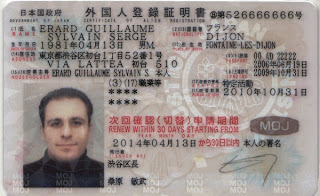Culture Shock and Japanese Visas
As an American that is in love with the Japanese Culture, I’m a bit familiar with the experiences many Japanese and/or Americans going thru when coming to learn of each others culture. One aspect I find interesting is the exceptions we each have when introducing the other to ones culture and how we expect them to handle culture shock. Many times we do not expect a person from the opposite culture to internalize their society beyond what is expected and vice-verse. Now I will admit we Americans don’t have as many of these expectations on Japanese, but I’m familiar with a couple minor ones to come up. For instance, it can be easily expected for a Japanese person to quick accept and learn about our culture, specially when they come to live here long term. Even more so it can be as equally surprising when a Japanese person does adopt our ways of life very quickly, such as adopting our eating habits. As I was once told Japanese usually never lose their Japanese Character. On the other hand we Americans seem to surprise the Japanese even more when we easily and quickly adapt the Japanese Character and bring many Japanese to shock at our adaptation. I had one guy who lived in Japan for something like ten years say, sometimes you do it for so long that internalize it and will find yourself doing things such as bowing while talking on the phone or quoting a kotowaza (Japanese Proverb) to make a point. According to an interesting online poll, other things gaijin– the work literary means “outsiders” — are known to surprise Japanese people include speaking using dialects like Osaka-ben, singing enka songs at karaoke, giving dates in the Japanese calendar system (e.g. Showa 43 instead of 1968), drinking fruit-flavored milk with a hand on one hip after a bath, and sitting seiza, or in proper Japanese kneeling position. Another thing that surprises Japanese people is when foreigners are polite, or then they line up properly in crowds. When Japanese go drinking with a foreigner they always seem to expect them to order a Budweiser, since that’s what all foreigners drink, right? But, instead I hear many gaijin tend to order popular Japanese drinks instead like atsukan, Hot Sake. The holy grail of a foreigner living in Japan is when a Japanese person temporarily forgets how to write a difficult kanji — You know what I mean, we Americans usually call this a Brain Fart — and you casually jot it down for them.

Japanese Visa
It seems that more changes are coming for foreigners living in Japan, which will be welcomed indeed. Gaijin living in Japan must naturally be registered with the Japanese government, and since 1952 foreigners have been issued an “alien registration card” which records the pertinent information Japanese officials might need access to. This card will be going away, replaced by a streamlined ID card that embeds various information about cardholder in an chip. The new cards go out of their way to abolish the work “alien” (which a lot of people disliked), fingerprint information is also kept out of the registry system entirely (since it made honest foreigners feel like criminals). The new registration system being many improvements, including increasing the length of stay for most types of visa-holders and ending the requirements that zainichi (“residing in Japan”) Koreans and Chinese, were born in Japan but maintain Korean and Chinese citizenship for cultural and/or political reasons, carry ID cards at all. Best of all, the “re-entry stamps” most foreign residents had to get before leaving the country (which required a day waiting in line and the local immigration office and cast $60 a year) are eliminated. The goal of the new system is to make gaijin feel more welcome in Japan and hopefully reverse the trend of foreigners leaving, just as the country needs them most. I know I feel a bit more confident that my stay in Japan one day will be much more pleasant because of these changes.


